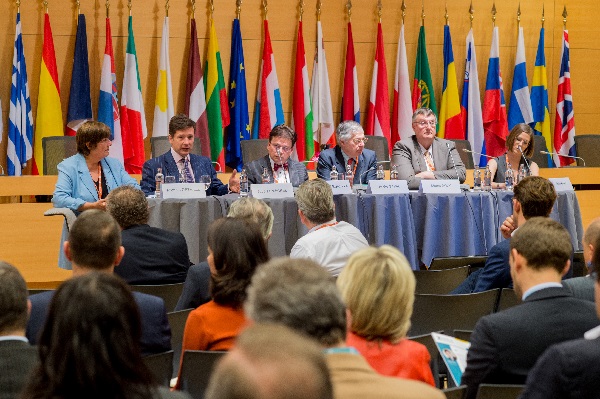 Credit: PwC
Credit: PwC
The 13th edition of Luxembourg's Journée de l'Economie (Jecolux), held on 28 February 2019, centred around the issues of protectionism, nationalism and global trade tensions.
Organised by the Ministry of the Economy, the Luxembourg Chamber of Commerce and FEDIL – The Voice of Luxembourg’s Industry, in cooperation with PwC Luxembourg, this year’s Jecolux was all about putting focus on global trade tensions and on ways to navigate uncharted waters. Throughout the day, experts from business, academia and politics discussed critical issues affecting trade and economic relations in the world.
One major issue was Brexit on which Emily Khan, Beyond Brexit Lead at PwC UK, gave a talk. Emily Khan highlighted the unintended consequences of Brexit and how it is leaving businesses paralysed. Khan’s advice to dealing with the growing trade uncertainties that loom around the topic was for companies to refocus on their future market strategy, compliance and sustainability in global markets.
Another important topic discussed during the event was the state of international trade and how it has been affected by recent global socio-political developments. In the wake of the transformations that the world has undergone in recent years, trade is now in a state of global uncertainty. André Sapir, Economics Professor at the Université libre de Bruxelles, who was a keynote speaker at the event, expressed his concerns regarding the future of globalisation and free trade amidst all these uncertainties. Discussing the potential impacts of a full-blown trade war and how such a scenario would be severely damaging for smaller countries, but also for the three major global powers (EU, United States and China), Sapir suggested that the World Trade Organisation (WTO) review its trade agreement policies and addresses the issue of taxation. Similar thoughts on globalisation and its impacts were also put forth by Dani Rodrik, Ford Foundation Professor of International Political Economy at Harvard University, during his keynote speech.
The existing skills gap and how businesses could play an important role in changing this was also taken up by John Parkhouse, CEO PwC Luxembourg, in his keynote speech. During his talk he referred to PwC’s annual CEO survey which this year showed “a record jump in pessimism”. This is not only due to concerns about policy uncertainties and trade conflicts but global unavailability of the right skills.
One thing that most experts at this year’s Jecolux agreed on was that Luxembourg was fairing well amidst all of the global economic tensions. Sapir attributed it to “good governance and the confidence that people have in the country’s government”. While Rodrik credited the country’s well-being to its strong competitive advantage.
Present at the event were also Carlo Thelen, Director General of Luxembourg Chamber of Commerce and Etienne Schneider, Luxembourg’s Deputy Prime Minister and Minister of the Economy.








